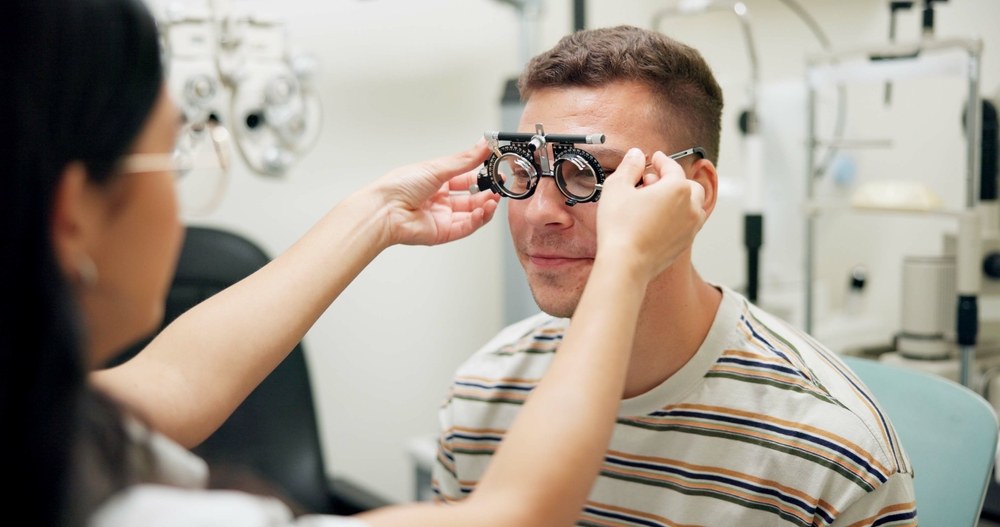
The Benefits of a Comprehensive Eye Exam
At D Vision Eyecare, we believe that your vision is essential to your overall well-being. Regular comprehensive eye exams are one of the best ways to safeguard your vision and eye health, even if you’re not experiencing noticeable issues.
What is a Comprehensive Eye Exam?
A comprehensive eye exam is a thorough assessment of your visual system. Unlike a basic vision screening, a comprehensive exam delves deeper, evaluating the overall health of your eyes and identifying any potential issues or underlying conditions. By taking the time to undergo this comprehensive assessment, you can gain invaluable insights into the state of your vision and take proactive steps to preserve it.
Addressing Vision Problems and Refractive Errors
One of the primary benefits of a comprehensive eye exam is its ability to identify and address vision problems and refractive errors. During the examination, your eye care professional will use advanced diagnostic tools and techniques to pinpoint any issues that may be affecting your vision.
For example, if you are experiencing difficulty seeing clearly at a distance, the exam may reveal that you are nearsighted (myopic), meaning that you have trouble focusing on distant objects. Alternatively, if you struggle to see clearly up close, the exam may indicate that you are farsighted (hyperopic), where your eyes have difficulty focusing on nearby objects.
In addition to these common refractive errors, a comprehensive eye exam can also detect more complex vision problems, such as astigmatism, which is an irregularity in the curvature of the cornea or lens, or presbyopia, a natural age-related condition that makes it challenging to focus on close-up tasks.
Detecting and Diagnosing Eye Diseases
A comprehensive eye exam is not only essential for addressing vision problems and refractive errors, but it also plays a crucial role in detecting and diagnosing various eye diseases and conditions. During the examination, your eye care professional will closely inspect the internal and external structures of your eyes, looking for any signs of potential problems.
Some of the eye diseases and conditions that can be identified through a comprehensive eye exam include:
· Glaucoma: A leading cause of irreversible vision loss, glaucoma is characterized by increased pressure within the eye, which can damage the optic nerve.
· Cataracts: The gradual clouding of the eye's natural lens, which can significantly impair vision over time.
· Age-related Macular Degeneration (AMD): A condition that affects the macula, the part of the eye responsible for central vision, and can lead to vision loss.
· Diabetic Retinopathy: A complication of diabetes that can damage the blood vessels in the retina, potentially leading to vision impairment.
· Dry Eye Syndrome: A chronic condition characterized by insufficient tear production or poor tear quality, which can cause discomfort and vision problems.
Uncovering Systemic Health Conditions
A comprehensive eye exam can also provide valuable insights into your overall systemic health. Your eye doctor may identify indicators that could be linked to systemic diseases, such as:
· Diabetes: Changes in the blood vessels of the retina can be an early sign of diabetes, even before other symptoms appear.
· High Blood Pressure: Certain changes in the blood vessels of the eye can be indicative of hypertension.
· Autoimmune Disorders: Conditions like rheumatoid arthritis, lupus, and multiple sclerosis can sometimes manifest in the eyes.
Tailored Vision Care
The insights gained from a comprehensive eye exam allow your eye doctor to tailor your vision care plan to your specific needs. Based on the results of the examination, they can develop a personalized approach to managing your visual health, which may include:
· Prescribing Corrective Lenses: If refractive errors are identified, your eye care professional can provide you with the most suitable eyeglasses or contact lenses to correct your vision.
· Developing a Treatment Plan for Eye Diseases: If any eye diseases or conditions are diagnosed, your eye care professional can work with you to create a comprehensive treatment plan, which may involve medication, specialized therapies, or even surgical interventions.
· Providing Lifestyle Recommendations: Your eye care professional may offer guidance on lifestyle factors that can impact your visual health, such as optimal lighting, screen time management, and nutrition.
By tailoring your vision care based on the results of the comprehensive eye exam, your doctor can ensure that you receive the most effective and personalized treatment, ultimately helping you to maintain optimal vision and eye health throughout your life.
Book Your Comprehensive Eye Exam with D Vision Eyecare Today
A comprehensive eye exam is a vital investment in your overall health and well-being. By taking the time to undergo this thorough assessment, you can gain valuable insights into the state of your vision and eye health, allowing you to take proactive steps to preserve and enhance your sight.
Schedule your comprehensive eye exam with D Vision Eyecare for quality vision care and personalized solutions for your needs. Contact our office in Allen, Texas, by calling (972) 649-4441 to book an appointment today.





